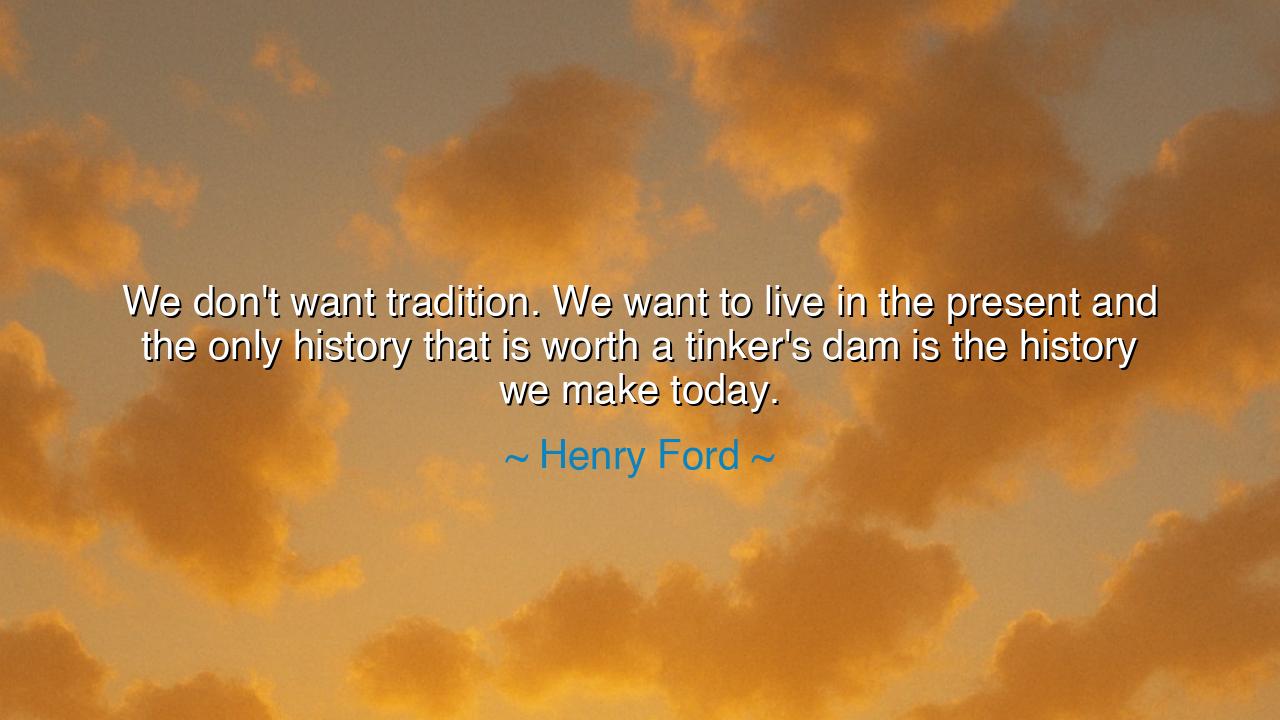
We don't want tradition. We want to live in the present and the
We don't want tradition. We want to live in the present and the only history that is worth a tinker's dam is the history we make today.






In the daring and visionary words of Henry Ford, we hear the cry of a man who sought not to preserve the past, but to reshape the future: “We don’t want tradition. We want to live in the present, and the only history that is worth a tinker's dam is the history we make today.” These words are not a rejection of memory, but a rebellion against stagnation. Ford, the titan of industry and the father of modern manufacturing, spoke as one who had seen the power of invention break through the walls of convention. His words are both a challenge and a prophecy: that progress cannot be born from reverence alone, but must come from those who dare to act in their own time.
The origin of this quote lies in the fiery heart of early 20th-century America—a world in transformation. The horse was giving way to the automobile, the farm was becoming the factory, and the world was shifting from tradition to technology. Ford, a man of humble beginnings who revolutionized both industry and society, spoke at a time when innovation was resisted by those who feared change. When he said, “We don’t want tradition,” he did not mean that the past had no value, but that clinging to it at the expense of progress was death to the human spirit. To him, the past was not a temple—it was a tool, and tools must always serve the living, not the dead.
To live “in the present,” as Ford said, is to recognize that the world is constantly reborn. Every dawn brings new problems, and every generation must invent its own answers. Ford’s factories themselves embodied this truth. With his revolutionary assembly line, he transformed the labor of many into a single, rhythmic act of creation—reducing the time to build a car from twelve hours to less than two. The result was not only a machine, but a movement; he placed the automobile within reach of the working man and set the world in motion. It was not the preservation of tradition that achieved this, but the boldness to redefine what was possible.
Yet, his words also carry a warning. Tradition can be a comforting chain, binding those who fear uncertainty. Many laughed at Ford, mocked him as a dreamer, or accused him of arrogance. But like all innovators, he saw what others could not—that the future does not wait for permission. He refused to build his factories in the image of the past, for he understood that history favors the builder, not the bystander. To him, history was not a record to be admired—it was a battlefield upon which each generation must leave its mark.
Consider the story of the Wright brothers, who, like Ford, were born in a time when men believed flight to be a myth. The learned scholars mocked them; the newspapers ignored them. Yet, through faith in their vision and tireless experimentation, they took to the sky. Their names are now immortal not because they studied history, but because they made it. They were men of Ford’s spirit—those who believed that the present moment, seized with courage, could rewrite the course of all that followed.
But Ford’s words are not a call to recklessness; they are a call to creative courage. He does not tell us to forget the past, but to outgrow it. To honor one’s ancestors is not to repeat their deeds, but to continue their work—to take the fire they lit and carry it farther than they dreamed. For every generation has its own frontiers, and those who cling to old ways will be left behind as the brave march forward.
So, my children, learn from Ford’s fire: do not be bound by what was—build what will be. Tradition may offer wisdom, but it is no substitute for action. Look around you, at the world of today—the challenges, the divisions, the cries for renewal. Do not wait for history to bless your deeds; make your deeds worthy of history. Each sunrise is an unwritten page, and each choice you make is a word upon it. Be the author of your age, the maker of your moment. For the only history worth remembering is the one that you dare to create today.






AAdministratorAdministrator
Welcome, honored guests. Please leave a comment, we will respond soon